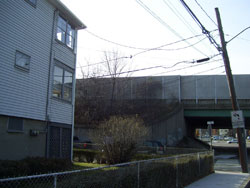Project looks at air quality along the I93 corridor By Julia Fairclough If you are over the age of 40 and live in either Ten Hills, East Somerville, or the Mystic River Apartments, researchers want to talk to you about whether living by the highway is a health risk. Tufts University is working with Somerville Transportation Equity Partnership (STEP) on the "Community Assessment of Freeway Exposure and Health" study, of which the first part entails asking eligible participants to have their weight and blood pressure taken, as well as answer specific questions about health issues. Data from interviews in Somerville will be taken through this summer. The study will then move on to South Boston, Dorchester, and then Chinatown, said Doug Brugge, a Tufts Medical School professor who is directing the project. |
|||
The aim is to generate enough quality health data to publish in an academic journal, and eventually use as leverage should any future issues come up regarding projects in the I93 area.
"In order to promote changes in policy and practice that will address problems like this, we need some science to support it," Brugge said.
Several Boston communities-including Somerville-are located near major highways. Residents of these communities may be exposed to high levels of car and truck exhaust. This exhaust contains invisible, odorless particles and gases, such as carbon monoxide. Studies have shown that living near highways is linked with higher rates of heart disease, asthma, and lung cancer.
While one part of the study entails randomly seeking volunteers to gather health data, the other part entails assessing changes in air pollution levels.
Thus far, researchers have learned that weather patterns impact the volume of pollution, said STEP President Ellin Reisner. Pollution is worst early in the morning, and during cold weather. Those living downwind of the pollution are faced with the poorest air quality.
"So thus far we do know the simple things, like to tell people who jog along Mystic River and I93 to jog in the afternoon, rather than in the morning," she said "But we still don't know, and are working on finding out, is how serious the exposure is, and how to reduce it."
Once all the data is collected this summer, people will assess what's next, with the goal on delivering specific information on how to reduce the risk of exposure to pollution.
Also, once the researchers have a better idea of air patterns, they can make suggestions when new projects spring up along the I93 corridor of Somerville, Reisner said. For example, any new building projects would require air filtering systems. The city would know to avoid building new schools or medical buildings (e.g., hospitals) in the area. Designers would also know not to put in windows that face the highway.
Reisner also points out that people should not be alarmed by a researcher showing up at their doorstep, as visits are random and thus not prearranged. "While it is good to not talk to strangers, if anyone has identification as one of our researchers then please help them out," she said. "The important part, collecting health data, is the most challenging."
People can call Don Meglio at 617-636-2100 if they have any questions.














Reader Comments